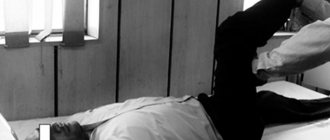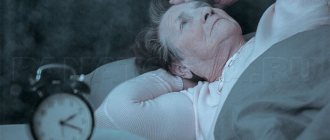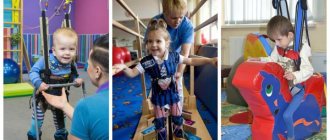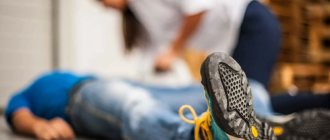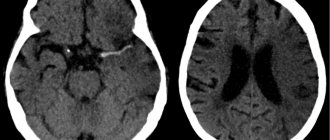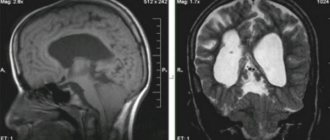Fainting during exams: what you need to know
The period for taking the Unified State Exam starts today. And in almost every school, fainting is reported in children every year at this time. What is the reason for this, and what should be done in such situations? Let's ask a specialist.
Varvara Veretyuk, a therapist of the highest category at the Zdravitsa Center for Medical Care, considers the issue of fainting in children and adolescents quite relevant. According to the doctor's data, under the age of 18, 15% of people experience this phenomenon, and throughout their lives, up to 50% of the population may experience fainting.
“Although many are accustomed to considering fainting as something harmless, associated with emotional distress or heat, up to 3% of calls to the ambulance service and up to 5% of hospital admissions are, again, associated with fainting. So it’s also an important medical problem.”
, says the specialist.
– Varvara Vasilievna, what are fainting?
– Fainting (or syncope is the medical name for fainting) is a short-term loss of consciousness that occurs due to decreased blood supply to the brain. This disorder develops quickly, does not last long and goes away on its own. The brain receives 15% of the blood volume that the heart throws out with each beat, and stopping blood flow to the brain even for 6-8 seconds is enough to cause loss of consciousness.
This is why there can be many causes of fainting, and although harmless reflex syncope most often occurs in children (60-95% of all fainting), in 5-6% of cases, loss of consciousness in children and adolescents is associated with heart rhythm disturbances, so doctors pay close attention to this symptom.
– For what reasons can fainting occur?
– I have already mentioned reflex fainting, they occur most often and are associated with the fact that the nervous system has an “erroneous” reflex effect on the blood vessels and heart rhythm. Because of this, the blood vessels dilate, the heart rate may slow down, and blood pressure suddenly decreases, which leads to a sharp drop in cerebral blood flow.
In children and adolescents, this situation often occurs when it is necessary to stand for a long time, or during a sudden transition from a sitting or lying position to a standing position.
Also, reflex fainting is provoked by strong emotions, for example, fear of an exam, fear of pain (before taking tests), contact with blood. The situation can be aggravated by hunger, heat, being in a stuffy room, and insufficient fluid intake, which leads to dehydration and low blood pressure.
During adolescence, when the body grows rapidly, the heart and autonomic nervous system sometimes cannot keep up with the growth of muscles and skeleton, so these disorders are more common in girls and boys. Another variant of reflex fainting occurs when playing wind instruments or lifting weights.
– Fainting among young people often occurs during exam periods. What factors are relevant here?
– We often hear about young people fainting during exams - in the summer the body loses more fluid, children worry about “just not to fail”, sometimes they wait a long time for their turn, standing in front of the office doors, they drink not enough water so as not to go to the toilet, eat little due to emotional stress. All this can lead to faintness or loss of consciousness.
Other causes of loss of consciousness include serious medical conditions that require the attention of a doctor: loss of fluid (such as bleeding, vomiting or diarrhea), cardiac arrhythmias and other cardiovascular diseases, diabetes and others.
– What recommendations can you give to parents who have experienced fainting in their child?
– Since in 5% of cases fainting can be caused by serious medical conditions, it is recommended that after fainting it is necessary to undergo an examination by a pediatrician if the fainting occurred in a child or adolescent, or by a general practitioner in the case of young people over 18 years of age.
The doctor asks in detail about the circumstances of the fainting, the state of health of the patient and his family, the presence of seizures in relatives, conducts an examination, and measures the pressure while lying and standing. The basic examination also includes electrocardiography (ECG). In case of changes, an additional examination and consultation with specialized specialists are prescribed.
– Is there a way to prevent fainting?
– Of course, and this, first of all, is working with factors that provoke fainting. If you have an exam or an exciting event coming up, try to get enough sleep the night before, don't skip breakfast, and bring some snacks like nuts and fruit, as well as drinking water.
If you feel sudden weakness, darkening in your eyes, nausea, dizziness, immediately try to lie down, or at least sit on the floor, leaning your back against the wall and stretching your legs - this will help improve blood flow to the brain, and will also protect you from falls and injury if fainting will still occur.
If fainting in a teenager or young man occurs when standing up abruptly or due to prolonged standing, it is recommended to start the morning with water or other drink (300-500 ml), and also avoid abruptly getting up from bed or from a chair.
And remember about a healthy lifestyle, because proper nutrition and regular physical activity are a great way to improve the condition of blood vessels and the heart, and the body as a whole.
Causes of fainting in children
Children of any age are susceptible to fainting. The key to this issue is a sudden decrease in the flow of blood or glucose to brain cells, which causes neurocytes to temporarily “turn off.”
Possible reasons:
- severe pain syndrome;
- very strong emotion (joy, fear);
- prolonged fasting;
- massive blood loss;
- infectious diseases accompanied by intoxication shock;
- mental overload. Due to the immaturity of the brain, the baby cannot always withstand the pressure usual for an adult patient.
A common cause of this situation is traumatic brain injury. The baby may fall and hit himself hard, causing him to lose consciousness.
Providing first aid
If a child faints, it is recommended that he be given first aid in a timely manner. The tone consists of performing sequential actions:
- The child is placed on the bed on his back. The legs are raised so that they are at an angle of 30 degrees. For this purpose, a pillow is placed under them. This position ensures a full flow of blood to the head, which increases the amount of oxygen in the brain.
- It is recommended to provide access to fresh air in the room where the patient is located. The child needs to remove clothes that are constricting his body.
- If a child faints, you need to help him come to his senses. They pat him on the cheeks or splash his face with cold water. If these measures do not bring results, then the whiskey is lubricated with ammonia. It is recommended to give this medicine to the child to sniff.
- After that. Once the child comes to his senses, it is strictly forbidden to put him on his feet. He should remain in a lying position for several minutes, which will ensure complete restoration of blood supply to the brain.
- The victim is recommended to take sweet tea or juice, which will speed up the recovery process.
Proper provision of first aid will help get rid of syncope in children in a short time.
Treatment after fainting
Whether you need any treatment after fainting depends on the cause.
In case of reflex fainting, provoking factors should be avoided, since no treatment is required in this case. If you faint while your blood is being drawn, tell the nurse so they can have you lie down on the couch before pricking your finger or giving the injection. If you don't understand what exactly causes fainting, but your doctor says there is no threat to your health, you can keep a diary to determine the triggering factors.
In case of anemia, it is necessary to find out its cause and correct it: the range of conditions leading to anemia is very wide - from an unbalanced diet to a tumor.
If you have low blood pressure, it is recommended to avoid dehydration, not to eat large meals, and to drink caffeinated drinks. To prevent the pressure from dropping sharply, after you get up, you can resort to special maneuvers: cross your legs, tense the muscles in the lower part of your body, clench your fists or tense your arm muscles.
If fainting is caused by taking any medications, the doctor will stop or replace the culprit drug, change the dose or time of administration.
Some heart conditions will require surgery, including installation of a cardioverter-defibrillator (a device that monitors the heart's rhythm). In other cases, conservative therapy, for example, antiarrhythmic drugs, helps.
Symptoms of fainting
The clinical picture of the corresponding pathology can be divided into the pre-fainting stage, the phase of loss of consciousness and the post-fainting state.
The following symptoms are warning signs of a problem:
- severe weakness;
- dizziness;
- paleness of the skin;
- slow breathing;
- nausea;
- darkening of the eyes;
- cold sweat.
After this, the child loses consciousness. In the post-harvest state, the patient complains of weakness and general poor health. The duration of the unconscious period depends on the individual characteristics of the organism. The baby may not come to his senses from several seconds to several minutes.
When should you see a doctor if you faint?
If you faint, this is not always a reason to see a doctor. For example, if nothing like this has happened before, if this is the first fainting spell in several years, then most likely you do not have any life-threatening diseases. However, there are “red flags” for the person and for those who witness the fainting, indicating that they need to seek medical help:
- fainting lasts more than 2 minutes;
- fainting occurs frequently;
- You fainted for the first time after 40 years;
- You were injured while fainting;
- you have diabetes;
- You are pregnant;
- you have had or have heart disease;
- before fainting you felt chest pain or strong or irregular heartbeat;
- during fainting, urinary or fecal incontinence occurred;
- if you start to feel short of breath.
What will the doctor do?
The doctor must understand what is the cause of fainting and whether there is a threat to life and health. To do this, he will ask about the episode itself, about the medical history, about the illnesses of relatives (especially about early heart problems), conduct an examination and do an electrocardiogram. It is very important to tell your doctor everything you felt before and after you fainted, as additional symptoms can be very helpful in making a diagnosis. For example, chest pain in some cases indicates acute coronary syndrome (myocardial infarction or unstable angina) or pulmonary embolism. Rapid heartbeat is often a sign of arrhythmia. Shortness of breath may be a manifestation of heart failure or pulmonary embolism. Headache in some cases indicates vascular disorders and hemorrhages.
Often, the patient, among other things, has a stool test for occult blood (this checks for bleeding in the gastrointestinal tract), a blood test to determine whether there is anemia, and a blood test for brain natriuretic peptide (this can indicate problems with heart). The woman will most likely be given a pregnancy test. The doctor can see how much your blood pressure and pulse change when you change your body position.
If the doctor believes that it is likely that carotid syncope has occurred, carotid sinus massage will be required to confirm the diagnosis.
If subarachnoid hemorrhage is suspected, a CT scan of the brain and a lumbar puncture may be needed.
If the doctor suspects that the problem is epilepsy, he will prescribe an electroencephalography.
If you suspect heart problems, your doctor may admit you for observation in the hospital, send you for an ECG and echocardiography, perform Holter monitoring (24-hour ECG recording), electrophysiological study of the heart, or coronary angiography. In difficult cases, an implantable (subcutaneous) loop ECG recorder may be installed for several months.
A high risk of severe consequences is indicated by:
- ECG abnormalities;
- structural changes in the heart;
- symptoms indicating heart failure (shortness of breath, weakness, fatigue, swelling, etc.);
- low blood pressure (systolic - “upper” - below 90 mm Hg);
- shortness of breath before or after fainting, or at the time of treatment;
- blood hematocrit is less than 30%;
- old age and the presence of concomitant diseases;
- sudden deaths in the family due to heart problems.
Prevention
To prevent fainting in adolescent girls, it is recommended to carry out their prevention in a timely manner. The girl should have a full breakfast. During the period of puberty of a teenager, parents are recommended to provide him with a balanced diet , which will ensure the supply of vitamins and microelements in sufficient quantities.
In the summer, when the air temperature is excessively high, the girl is recommended to go outside only in a hat. It is recommended to organize the correct daily routine, observing the alternation of stress and rest. The girl should avoid excessive physical activity. Long-term travel by vehicle is not recommended.
Fainting is a symptom in teenage girls, which indicates the impact of unfavorable environmental factors or the occurrence of serious diseases in the body. If a symptom appears frequently, it is recommended to consult a doctor to undergo diagnostics and determine the causes. This will allow us to prescribe effective therapy for the girl.

